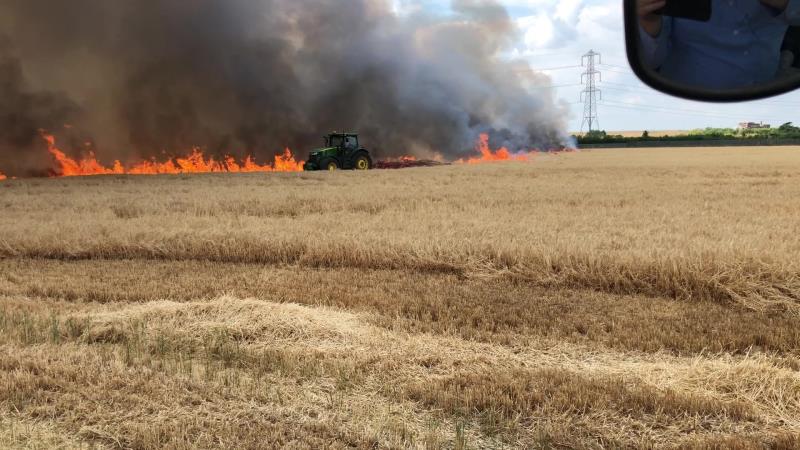Mid and West Wales Fire and Rescue Service have issued some key safety advice and tips that will help to reduce the risk of fire.
What farmers can do
To reduce the likelihood of a fire occurring on your farm there are number of things you can do.
- Ensure that harvest machinery is well maintained and checked regularly, lubricated and that it is clean from oil, fuel and excessive dust and debris build up. Following storage pay close attention for signs of birds' nests and vermin damage to electrical systems. On larger machines such as self-propelled foragers and combines, consider fitting fire suppression systems.
- Carry an extinguisher when carrying out harvesting operations make sure it's secured to the machine and not let loose in the cab as this could cause serious injury in the event of an overturn. Ensure the extinguisher is regularly maintained by an approved supplier.
- Avoid parking tractors/foragers and combines in close proximity of combustible material such as bales.
- Bales overheating- make sure hay/straw is sufficiently dry before baling and left to cool outdoors before storing. Farmers who have concerns about their bale stacks overheating can request a FREE bale stack temperature check from Mid and West Wales Fire Service. Farmers must be vigilant, checking for signs of stack venting early in the morning (steaming) and for signs of discolouration to the bales. Contact the Fire service on 01268 909408 for a FREE bale test, or 999 if you believe it to be at high risk. DO NOT CLIMB ON TOP OF BALE STACKS as they can collapse inwardly in the event of heating have occurred.
- Avoid carrying out any controlled burning (bonfires), or if necessary, make sure that it is well away from farm buildings and that you have sufficient means to extinguish and control. Always remain with and supervise the fire until it is fully extinguished. In dry conditions small fires have been known to creep and reach farm buildings.
- Take great care when carrying out hot repairs such as welding or grinding, be mindful of sparks and have a suitable means of extinguishing media on hand. Carry out any work well away from flammable materials such as hay and straw.
Planning ahead
Planning ahead in case of a fire can also help. Here are some tips to be prepared:
- Request a FREE farm fire prevention visit from a Farm Liaison Officer to advise on matters such as:
- Reducing the likelihood of a fire occurring in the first instance and identifying possible ignition sources.
- Identifying hazards to fire crews attending i.e. fuel storage, gas cylinders, fertiliser and chemical stores, renewable energy systems.
- Identifying logistical issues such as limited access, poor water supplies and pre-planning for these issues.
- Creating a livestock evacuation plan.
- Creating a fire action plan folder available to responding fire crews including site plans and
- Details of dangerous substances such as chemicals and fertiliser and how to access water supplies.
The Mid and West Wales Fire Service (@mawwfire) are offering free bale temperature testing to check the temperature and moisture content of bales.
— NFU Cymru 🚜 (@NFUCymru) August 5, 2022
Call their farm liaison officer if you're concerned 👇 pic.twitter.com/ZntqqqcfnT
What to do in the event of a fire
You should only attempt to tackle the fire if it is safe to do so and you have sufficient extinguishing media to do so. If the fire's not out within 20 to 30 seconds, then it is time to move to safety and call for the fire service.
When calling the Fire Service:
- Give clear directions to the location of the fire, we recommend the use of What3words to pinpoint a farmer's location to a three-metre square.
- Send someone to meet oncoming appliances at the farm entrance (take a torch at night) and display your farm name at the end of the driveway.
- Tell the operator what is on fire and may become involved in fire.
- Inform the operator of any issues that may affect us attending, ask for 4x4 capability if required.
- Be ready to assist fire crews with on-site farm machinery such as front-end loaders and telehandlers.
- Make yourself known to the fire crew on arrival and remain on hand to answer any questions that they may have.
REMEMBER - Never put yourself at risk when tackling a fire
Fire Risk Assessment
Farmers can carry out their own fire risk assessments by adhering to the following five steps:
- Identify hazards - These could be sources of ignition such as welding or grinding equipment. Look for sources of fuel, these can be anything that burns, from hay to petrol. Dangerous substances such as chemicals, fertiliser and asbestos must be identified as well.
- Identify people at risk - These include people who work for you, visitors, children and other vulnerable people, and fire fighters who respond to an emergency.
- Evaluate the risk of fire occurring and the risk to people - Wherever possible remove or reduce fire hazards. This could be by installing smoke and fire alarms, firefighting equipment and identifying escape routes.
- Record significant findings and actions you have taken - Prepare an emergency plan. Inform and instruct anyone who might be affected and provide training.
- Review the assessment on a regular basis to make sure it is up to date.
